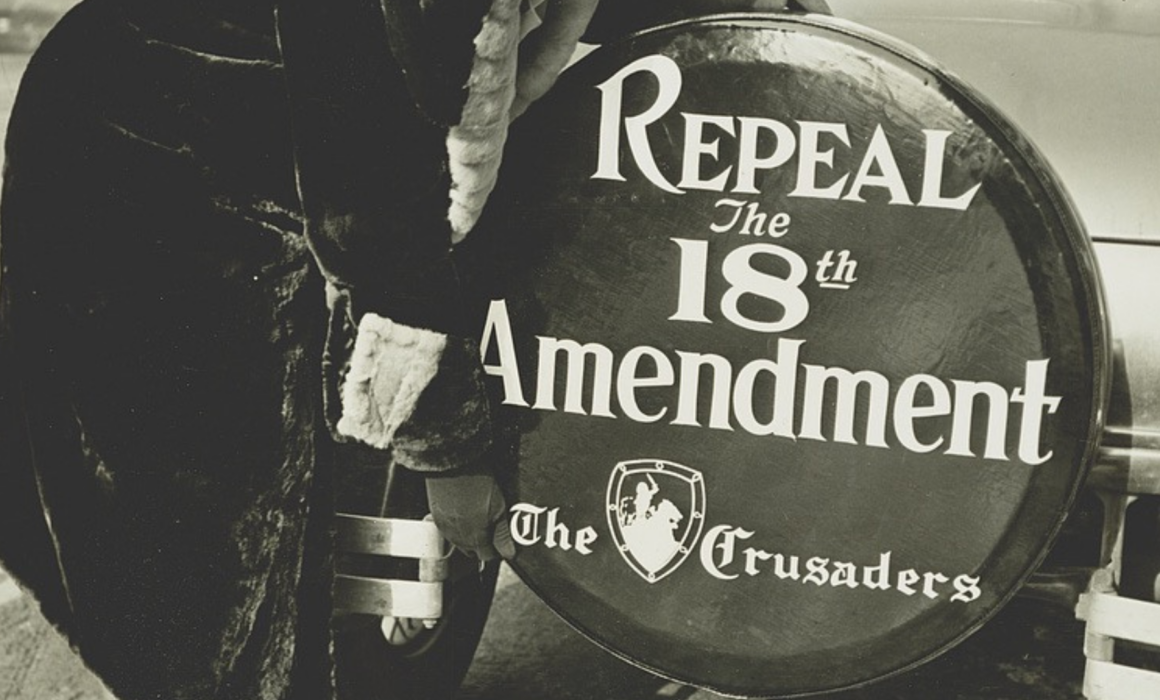Nothing Good About the 18th Amendment
By Virginie Boone
In January 1919, the United States Congress ratified the Eighteenth Amendment, banning the manufacture, transportation and sale of intoxicating liquors. It took two years from introduction of the amendment to passage, while President Woodrow Wilson was in office.
Groups that lobbied heavily for what was at times called the “Bone Dry Amendment” included the Anti-Saloon League of America and National Woman’s Christian Temperance Union; among the opposition was the United States Brewers Association, as well as anti-Prohibition labor organizations. Others, like the Chanute Methodist Episcopal Church, told Wilson he should remove all liquor from the White House.
In support of their cause, the Anti-Saloon League penned the “Twelve Reasons for Total Abstinence,” in which number one was “because modern science has proven that alcohol is a poison destructive of all life, wounding when it does not kill,” and number two was “because alcoholic liquor creates an appetite that cannot be satisfied with moderation but leads to excess.”
We seem to be at these shades of black and white again.
The propaganda campaign back then was fierce and included posters of ragged children standing outside a bar lamenting, “Daddy’s in There…” and pleading, “Wanted – A Father: A Little Boy’s Plea.”
Other posters played on the hardships of World War I, asking, “In War or Peace Which Needs it Most?” with a picture of a Saloon Keeper juxtaposed against a Home Maker and detailing that even at “war prices,” “three 10-cent drinks a day for a year” would instead buy 25 cans of tomatoes, 10 dozen oranges, 10 pounds of coffee or 4 gallons of molasses.
The Prohibitionist fight even took on a loyalty tinge, with each side accusing the other of being pro-German, according to records kept by the Library of Congress, with Prohibitionists called “incorrigible fanatics” pushing a “pro-German scheme to disgust and discourage the American people with the war.”
For their part, members of the Anti-Saloon League accused worse, saying, “the German American Alliance has been nothing but the National Brewer association under another name and most of the men who run the Brewers are Germans who are not citizens of this country.”
Others accused “foreign labor” of drinking to excess, while more free-minded folks tried to assert individual rights, stating, “workers here as in other countries should be allowed to use in
their discretion the stimulants which please them, which they think beneficial and to which they have the right as free men – regardless of the opinions of well-meaning meddlers.”
The war ended and Wilson had to decide, listening to arguments from all sides, including those who blamed women’s suffrage for Prohibition and others who cited the fact that doctors were prescribing liquors to “head off the terrible influenza epidemic.” Others made it a class issue, pleading that the 18th amendment would deny the laboring man “the personal privilege of a drink of liquor while the rich man has all he wants.”
Ultimately, the 18th Amendment was ratified by the states in January 1919. The Volstead Act, also known as the National Prohibition Act or War Prohibition Act, which followed in October of that year, provided enforcement, stating “The words ‘beer, wine, or other intoxicating malt or vinous liquors’ in the War Prohibition Act shall be hereafter construed to mean any such beverages which contain one-half of 1 per centum or more of alcohol by volume.”
Volstead also detailed punishment as fines “not less than $100 nor more than $1,000, or be imprisoned for not less than thirty days or more than one year, or both.”
Among the fighters who never gave up was a group called The Crusaders, a national organization formed to overthrow Prohibition and repeal the 18th Amendment sometimes derided by their rivals as “Cork-screw aiders.”
Inspired to act by the St. Valentine’s Day Massacre in Chicago, a bloody fight between rival bootleggers, their aim was to “get the facts about Prohibition,” and stop the growing wealth of gangsters. Rather than making liquor illegal, they aimed to encourage moderation through education.
Prohibition caused immeasurable loss of lives and livelihoods, a grim mark on American history lasting through 1933, the year the 21st Amendment repealed the 18th through a joint resolution of Congress. Let us never forget.


